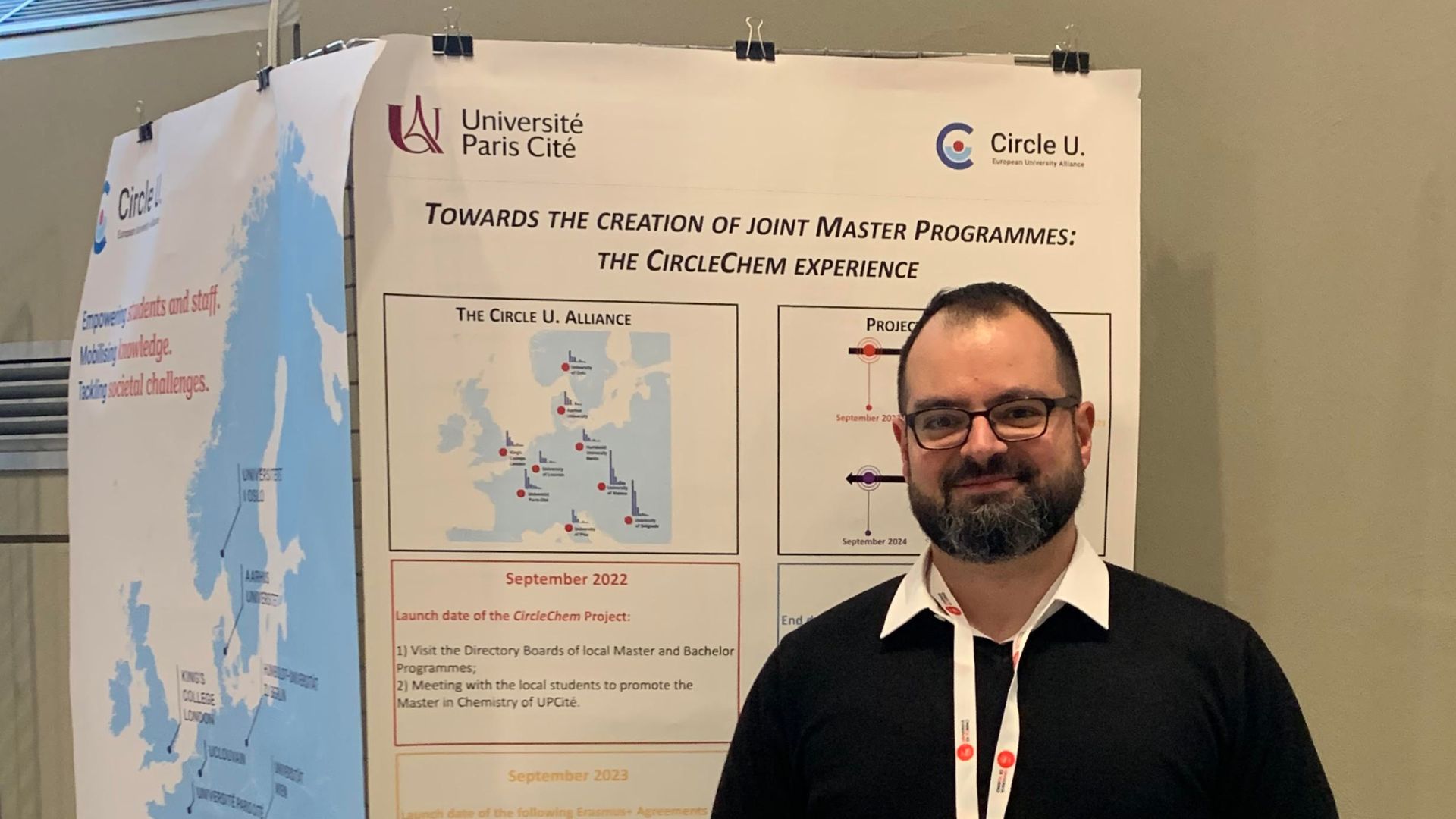Circlechem, Giorgio Mattana’s Master’s project in Chemistry

© Giorgio Mattana
L’alliance Circle U. rassemble : Université Paris Cité, Humboldt-Universität zu Berlin, King’s College, London, UCLouvain, l’Université d’Oslo, L’Université d’Aarhus, l’Université de Belgrade, l’Université de Pise et l’Université de Vienne.
Giorgio Mattana, Associate Professor within the Department of Chemistry at Université Paris Cité is the project leader of “CircleChem”. The project aims to create a European Master’s programme in chemistry within the Circle U. Alliance by strengthening scientific and teaching collaboration between partners. Discover more in this interview.
What is your role at Université Paris Cité in connection with Circle U. ?
I play the role of “interface” between the Circle U. Group at Université Paris Cité and my own department. Since 2016, together with another colleague, we are responsible for International Relations for our own department. In particular, I am in charge of the International Relations for our Master of Science Programme in Chemistry. I help our master students find an internship abroad and I accompany them along their administrative journey. My colleague does the same for the students of the bachelor degree programme. I provide my department with any information related to the alliance and respond to their questions. I also put them in contact with the right person at the central administration should they have a specific question or problem to be addressed. I am also the coordinator for the activities in the Empowering Research and Innovation Action (ERIA) project in work package that involves Citizens and Society in research and innovation.
Why did you get involved?
I got involved because I strongly believe in the European Union ambition of creating a common European University. In the course of my career, I had the opportunity to live in different countries: Italy, the United States, the United Kingdom, France and Switzerland where I had the chance to do my research but also to study. These experiences changed my life, not only in terms of knowledge of foreign languages (which is obvious) but especially because they allowed me to experience different perspectives, and navigate different cultures. This is essentially why I got involved: to help current students to enjoy the same opportunities or even better opportunities.
Why did you respond to the seed-funding call?
The Directory Board of our Master Programme has always promoted the internationalisation of our students in terms of periods spent abroad (study and internship mobility) especially, but not exclusively, within the Circle U. alliance. So when my colleagues and I heard about this opportunity we thought it would be a great chance to develop the internationalisation of our Master Programme within the framework of Circle U.
What is the objective of the project?
The goal of the project is to reach four partners within the Circle U. alliance, namely the departments of chemistry at the University of Pisa, University of Belgrade, Aarhus University, and at UCLouvain. The goal of each trip is twofold. Firstly, we meet the directory board of their master programmes in chemistry to verify if the programme is compatible with ours in terms of academic calendar, number and types of teaching units, number of ECTS associated to each teaching unit, possibility to do an internship etc… The second goal is to meet the local students, especially those who are completing their bachelor’s degree. This enables us to promote our own master programme and to inform them that they can join us through the SMARTS-UP scholarship, for example or simply through a study or an internship mobility.
How does the project lead to new research or educational opportunities ?
The programme allowed us to discuss with our counterparts in the countries mentionned, which then led to the creation of four bilateral ERASMUS+ agreements specifically addressed to the students of our department. We are also working with our international colleagues to develop a joint teaching unit which is called “International Collaborative Research Project”. This teaching unit is compulsory for our second year master students. It teaches them how to write and submit a European project funding proposal on a subject assigned by the teachers, and then to defend it in front of a jury. The idea is to involve our international partners and their students to create groups of students coming from different countries, a situation which is much closer to the reality of international project funding.
What are the next steps?
In the immediate future, the goal will be to increase the number of joint teaching units, using the hybrid (presence and remote connexion) format. Ideally, we would like to create a joint master programme involving as many partners as possible, though we know it is extremely challenging, especially from an administrative point of view. Ultimately, this will strongly contribute to the alliance because it will strengthen scientific and teaching collaboration between partners.
Prof Mattana would like to thank all the colleagues who have contributed to the project notably, the Directory Board of the ‘Frontiers in Chemistry’ Master Programme as well as the partners Directory Boards of the Master Programmes in Chemistry and Bioengineering.
For more information on Circle U.
Visit the website
Follow on Twitter LinkedinSubscribe to the Circle U. newsletter
Contact at Université Paris Cité
Read more
![[Circle U.] Internationalise your study plan without leaving home!](https://u-paris.fr/wp-content/uploads/2025/04/OPEN-CAMPUS-CIRCLE-U-1080x675.jpg)
[Circle U.] Internationalise your study plan without leaving home!
In an increasingly fast-paced and demanding world, developing new skills and gaining international experience are essential for strengthening your applications and easing your entry into the job market. The European alliance Circle U., of which our university is a...
read more![[Call for Applications – Circle U.] Entrepreneurial Change-making programme](https://u-paris.fr/wp-content/uploads/2025/06/change-making-2024.jpg)
[Call for Applications – Circle U.] Entrepreneurial Change-making programme
Keen to lead a meaningful project? Want to collaborate with other young people from across Europe to help shift practices? The Entrepreneurship for Change programme by the Circle U. European university alliance – of which we are a member – is back this November with a...
read more![[Circle U.] Immersion in the heart of the climate – virtual exhibition](https://u-paris.fr/wp-content/uploads/2025/05/La-France-en-2100-1080x675.jpg)
[Circle U.] Immersion in the heart of the climate – virtual exhibition
Circle U. the european alliance invites you to discover how its community sees the climate change. Through a photographic exhibition, the alliance invites you to take a virtual journey to the heart of our planet, to admire its beauty but also to become...
read more
Call for projects 2025 UPCité – King’s College London
The call for projects between Université Paris Cité (UPCité) and our privileged partner King's College London (KCL), has been launched this friday, May 9th 2025. The objectives Université Paris Cité and King's College London are offering offering a seed funding for...
read more